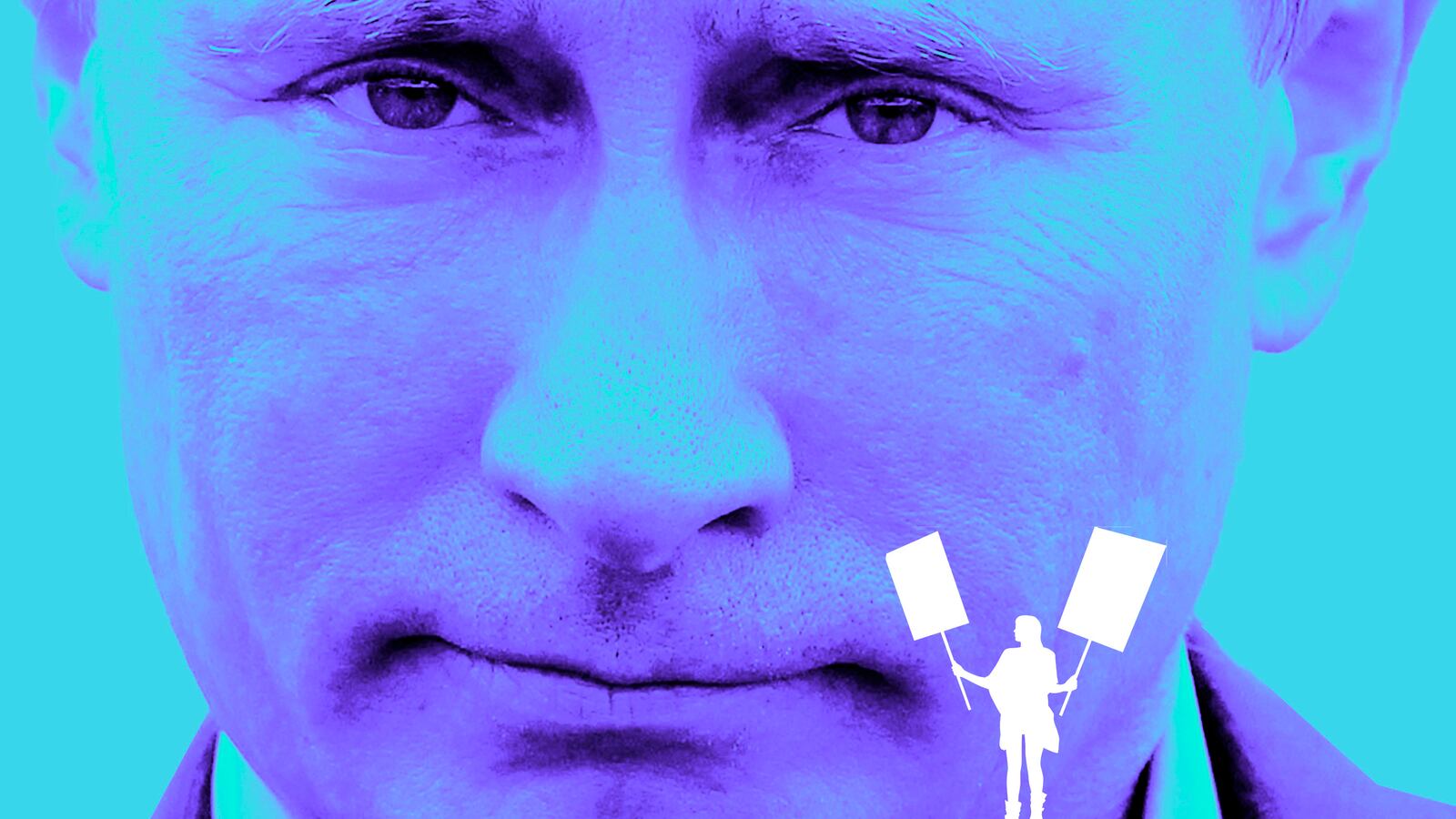MOSCOW—The crackdown on political opposition took a sinister twist during two months of coronavirus quarantines in the Russian capital. Marches and rallies were banned, so protests were reduced to what were called “solo pickets,” as in a picket line with only one person.
The protester would stand all alone, a surgical mask on his or her face and gloves on the hands that bore aloft a banner or placard in the last form of street expression allowed without a permit. And then police started arresting the single pickets, too, claiming they were breaking the lockdown rules.
Last Thursday, Alisa Ganiyeva unrolled a banner demanding freedom for her friend, Novaya Gazeta journalist Ilya Azar, who had been arrested for a solo picket demo late last month. Ganiyeva stood outside the Moscow city police headquarters for just a few seconds, she said, before the cops grabbed her.
“It was so absurd to hear them talk about COVID-19 distancing after two policemen came very close to me—and then shoved me into a crowded vehicle with other people in it,” Ganiyeva told The Daily Beast. “As they walked me away, I saw a crowd of soldiers celebrating Border Service Day in that very street.” She also saw policemen detain two girls who had the word “freedom” written on their masks.
The contrast with the mass protests taking place around the world right now, with many people consciously braving the coronavirus threat in order to march against racism and injustice, could not be more striking.
Under Russian law, a single-person protester must stand at least 15 meters, or almost 50 feet, from any other person with a sign. And that’s what they do.
But the Kremlin has an obvious conflict of priorities: 67-year old Vladimir Putin is eager to see Russians vote in a postponed referendum on constitutional amendments, now rescheduled for July 1, that would allow him to stay in power until 2036. For such an event, social distancing be damned. And Putin’s opponents, meanwhile, are left with the single picket protests as their last chance to say no to police violations and political repression.
“By law I have a right to stand in a single picket and I will continue to exercise my right,” Azar told The Daily Beast following his release on Sunday after 10 days in jail. “Because tomorrow they might ban us from walking in the streets. If we do not defend our right to this very last form of protesting, we’ll all end up behind bars tomorrow.”
A Moscow court had sentenced Azar for violating “requirements of the Moscow mayor’s decree that bans any public events.” But when Mayor Sergei Sobyanin ended the lockdown regime on Tuesday, people immediately flooded the streets and parks of the capital and traffic jams returned and, then, the detentions and arrests of single-man picket protesters continued.
On Wednesday police detained five solo pickets outside the Presidential Administration and 18 opposition activists were picked up for earlier political actions. Many people had to pay fines.
“The bigger the scale of repression, the braver we are—I am sure that people will find new forms to protest,” Mikhail Lobanov, a math professor at Moscow State University told The Daily Beast. On March 21, a few days before the COVID-19 official lockdown, Lobanov demonstrated against the arrest of a graduate student; the court fined him $145 on Wednesday.
Single-person pickets have become a popular movement in Moscow, St. Petersburg, Yekaterinburg and other Russian cities in the past few months as authorities grew more reluctant to approve street protests. In the past two weeks police have detained dozens of journalists, university professors, and students for single-person pickets. Many were sentenced to 15 days in jail.
Why is the Kremlin so afraid of a few individual people who were by definition socially distancing? “The last ounce of their patience must have been exhausted by the line of more than 200 people waiting to stand in a single picket outside the Federal Security Service [FSB] in February,” Azar said.
The few remaining elected deputies from the opposition, both in Moscow and St. Petersburg, say the current development shows rules are tightening.
A deputy in the St. Petersburg’s Legislative Assembly, Boris Vishnevsky, has been trying to offer legal help to detained protesters since late March. He makes the point that according to the Russian constitution the only time authorities can ban public protests, now limited to one-person protests in any case, is during curfew. But in Moscow and St. Petersburg authorities have been using the pandemic to terminate even the single pickets.
“This is the Kremlin’s tightest grip, the final bolt has been screwed," Vishnevsky told The Daily Beast. "After the first citation a detainee pays a $58 fine, after the second detention the punishment can be up to 15 days of jail and after the third single picket, you can go to prison for up to four years. The only place for protest left in Russia is the internet.”
A journalist at the independent radio station Echo of Moscow, Tania Felgenghauer, went to a solo protest in spite of police arrests. “A single picket is is not a crime,” her banner said. Two policemen grabbed her less than five seconds later, she said.
”It amazes me to see people in the United States consolidating in defense of dignity, defending law and human lives, while here only a few harmless protesters tried to exercise their legal rights and even they were shut up,” Felgenghauer said, then added, “My lawyer tells me I have used my limit for protesting this year.”






